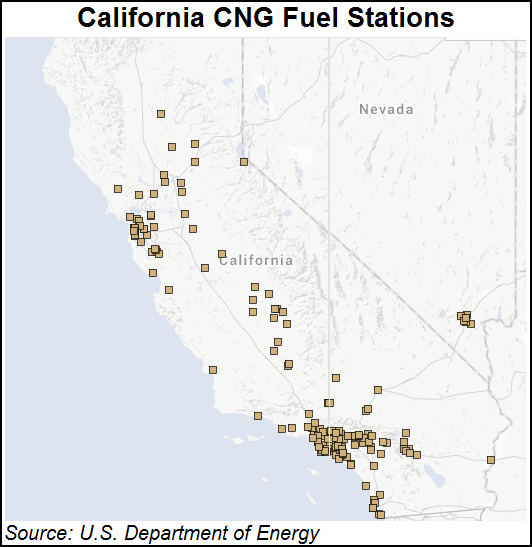Infrastructure | NGI All News Access | NGI The Weekly Gas Market Report
California Looks at NatGas for Transportation, Power Generation
The California Energy Commission (CEC) has approved millions of dollars more for natural gas vehicle (NGV) transportation development and separately is starting the review process on a proposed 1,936 MW natural gas-fired, air-cooled generation plant on the site of an existing 2,000 MW gas-fired, water-cooled AES Corp. plant in Long Beach, CA.

The five-member CEC’s site review committee has scheduled a site visit and scoping/information hearing Tuesday for the Alamitos project. In March, the five commissioners voted unanimously to approve the AES application as data adequate and eligible for full-scale consideration, one of several proposals before the energy agency to replace coastal plants that must discontinue ocean water cooling after 2020.
As a multi-plant coastal operator, AES has plans to repower and transform all of its sites along the Southern California coast during the next 10 years (see Daily GPI, Sept. 26, 2012).
With the state’s once-through-cooling (OTC) ban slated to be phased in during the next five to eight years, AES is holding 4,200 MW of gas-fired generating capacity in its three coastal sites: Alamitos Bay, Huntington Beach 10 miles farther south, and Redondo Beach in the South Bay area about 20 miles southwest of downtown Los Angeles.
Separately, the CEC last Tuesday approved more grants from last year’s Alternative and Renewable Fuel and Vehicle Technology Program to continue “sparking innovation” in California’s transportation fleet, according to CEC Commissioner Janea Scott. To date, the CEC program has distributed more than $400 million to 250 projects.
Other action included the CEC’s approval of more than $3.8 million in grants from last year’s investment plan for alternative vehicle fueling stations, alternative fuel readiness plans fuel cell delivery vans, establishing sustainable transportation centers, and more than $16 million for NGV incentives.
Another $3.8 million was distributed to eight different local government or regional associations and agencies to advance anything from compressed natural gas fueling to university-based sustainable transportation centers. The CEC has an approved 2014-15 investment plan aimed at reducing greenhouse gas emissions throughout the state’s transportation sector.
© 2024 Natural Gas Intelligence. All rights reserved.
ISSN © 1532-1231 | ISSN © 2577-9877 | ISSN © 1532-1266 |
